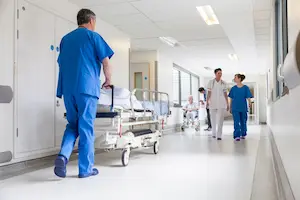 In healthcare facilities, there’s a continuous flow of patients, visitors, and medical personnel – all of which make maintaining a high level of cleanliness challenging. Effective pest management is a necessity to safeguard the health of your patients and preserve the integrity of your healthcare services. The presence of pests, such as rodents and insects, poses a risk of contaminating sterile areas and carrying numerous diseases.
In healthcare facilities, there’s a continuous flow of patients, visitors, and medical personnel – all of which make maintaining a high level of cleanliness challenging. Effective pest management is a necessity to safeguard the health of your patients and preserve the integrity of your healthcare services. The presence of pests, such as rodents and insects, poses a risk of contaminating sterile areas and carrying numerous diseases.
Without strict pest control measures, your healthcare facility may face severe repercussions, including damage to your reputation and potential legal challenges. At McCloud Services, our team specializes in pest control services tailored specifically for the unique demands of healthcare environments.
How Pests Enter Healthcare Facilities
Pests often gain entry into healthcare facilities through open doors, unsealed windows, vents, and other structural breaches. Once inside, they find numerous opportunities to breed and hide, especially in areas like food storage, laundry, waste disposal, and patient care zones.
The constant movement of patients and the delivery of supplies also act as additional pathways for pests. Addressing these vulnerabilities requires a strategic pest management approach that includes thorough disinfection and sealing of entry points.
Most Common Pests in Healthcare Facilities
Healthcare settings are hotspots for several types of pests, each bringing its own set of risks:
- Ants: Though generally less dangerous, ants can infiltrate sterile zones, risking the contamination of critical equipment and surfaces.
- Cockroaches: These pests are notorious carriers of numerous pathogens and find the humid, food-rich environments of healthcare facilities particularly appealing.
- Flies: Drawn to food waste and other organic materials, flies are significant vectors for disease, complicating efforts to maintain a pristine environment.
- Rodents: Mice and rats can transmit serious diseases like Hantavirus and Salmonella and are known to cause structural damage to buildings, highlighting the need for effective rodent control measures.
- Bed Bugs: Notoriously difficult to control, bed bugs can quickly spread from one area to another, potentially increasing patient discomfort and leading to secondary infections.
Challenges of Bed Bugs in Healthcare Facilities
Bed bugs are particularly troublesome in medical settings because of their ability to spread rapidly and the additional risk they pose of causing secondary infections from their bites. These pests are adept at staying hidden and can quickly multiply through hospital linens, clothing, and other fabrics.
To manage a bed bug problem effectively, healthcare facilities must implement a comprehensive strategy that includes:
- Regular Inspections for early detection of infestations.
- Continuous education so staff can be educated on how to recognize and prevent bed bug infestations.
- Professional bed bug treatments that are effective and safe for healthcare settings.
Discreet Pest Control for a Pristine Healthcare Facility
At McCloud Services, our commercial extermination services are designed to meet the specific pest challenges faced by healthcare environments. Our team strictly adheres to all health and safety regulations to provide expert extermination solutions that are sensitive to the medical context.
Choosing McCloud Services as your commercial pest management partner guarantees that your healthcare facility maintains the highest standards of cleanliness and safety. Contact us today to learn how we can help you maintain a clean, safe, and compliant healthcare environment for you!
Why Your Healthcare Facility Needs Expert Pest Control Pest Control and Exterminators in the Midwest
Serving...